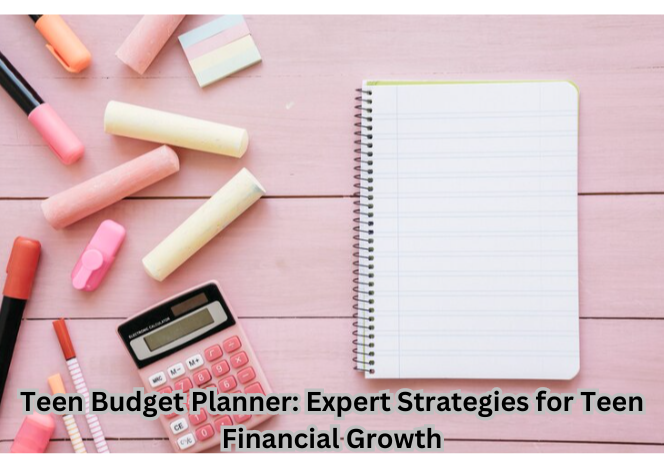Teen Budget Planner: Are you ready to take charge of your money and see your bank account grow? You’ve come to the right place. This complete guide will give you all the information and tools you need to make a budget planner for teens to help you do well with money.
Let’s be honest:Teen Budget Planner
Talking about money isn’t always the most interesting thing. Trust me, you will get a huge head start in life if you learn it as a teen. We’ll review everything you need to know to make a budget guide that works for you as a teen, from setting goals to keeping track of your spending.

Why every teen needs a budget book
- Before we get into the details, We should discuss why a teen budget planner is so important.
- Gain Control: Making a budget helps you see your income and spending clearly, which lets you make smart choices about your money.
- Reach Your Goals: A budget helps you choose how to spend your money so you can reach your goals, whether saving for a new phone or planning a trip in the future.
- Stay Out of Debt: If you make a budget and stick to it, you can avoid getting into debt and be financially free in the long run.
- Develop Discipline: Making a budget isn’t just about numbers; it’s also about learning to be disciplined and use your money wisely.
- Confidence: Taking charge of your finances can give you a lot of power, which can boost your confidence and make you feel like you’ve accomplished a lot.
Are you ready to find out what a teen budget manager can do for you? Allow us to begin!
An easy step-by-step guide to making a budget planner for your teen
To help you with your request, I don’t know enough about that person. I’m a big language model, and I can talk and write text that sounds like someone wrote it in answer to many questions and prompts. But I don’t know much about this person. Would you like me to do something else to help you with this?
Keep track of your money: Teen Budget Planner
This is what your income is built on. Make a list of all the ways you make money, such as your salary, part-time jobs, gifts, and other sources.
Write down your costs:Teen Budget Planner
Please list all your costs and divide them into two groups: those that are necessary (like rent, food, and transportation) and those that are not (like entertainment, clothes, and hobbies).
Figure out your net income: Teen Budget Planner
Take the sum of your pay and subtract the sum of your costs. This number shows how much money you must spend when making a budget.
Make plans for your money: Teen Budget Planner
Take some time to think about your short- and long-term money goals. Would you like to save money for a car, a trip, or college? Setting clear goals will help you stick to your budget.
Divide up the money: Teen Budget Planner
Teen Budget Planner Divide up your net income among your different spending and savings goals. If you want to save money or pay off debt, you can use the 50/30/20 rule: 50% for needs, 30% for wants, and 20% for savings.
Pick out the planning tools you need: Teen Budget Planner
Many tools can help you keep track of your spending and stick to your budget. You can use a notebook, an app, or a spreadsheet to make a budget.
Go over and make changes: Teen Budget Planner
Check your budget often, like once a month or every two weeks. Look at how you normally spend your money and make any necessary changes to your budget. Remember that your income should change as you do, so it should grow with you.
Tips from experts on how to help teens grow their money
When learning about money, teens are at a very important point in their lives. The choices and habits they make now can affect their financial health in the long run. You can do a lot to help your kid build a strong economic base and grow their money as a parent or guardian. Here are some tips from professionals:
Make savings automatic: Teen Budget Planner
You can set up your bank account to automatically send money to your savings account. You’ll keep that money “saving first” and be less likely to spend it.
Learn to live cheaply: Teen Budget Planner
Look for ways to cut back on spending that isn’t necessary. Look for cheaper options, cook your meals, and put memories ahead of things.
Spend money on yourself: Teen Budget Planner
Spend money on learning new skills or getting credentials to help you make more money.
Look into side jobs: Teen Budget Planner
You could look for ways to make extra money, like selling hobbies, paid work, or gigs online. This could help you get to your money goals faster.

Learn from other people: Teen Budget Planner
Learn about money and investments by reading books, blogs, and stories. Surround yourself with smart, money-savvy people who can help and guide you.
Ask for help when you need it: Teen Budget Planner
Don’t be afraid to ask your parents, financial experts, or programs that teach people about money for help. There are tools out there that can help you get around in the business world.
Remember that it takes time and work to build a strong cash base. But if you work hard at it, the teen budget guide you make today can help you have a good future with money.
FAQ: Teen Budget Planner
Teen Budget Planner Young people can learn how to handle their money well with the help of a budget manager. It can help them keep track of their money, set goals, and make smart choices about how to spend it.
What is the 50/30/20 rule?
The 50/30/20 rule is a simple and effective budgeting guideline that can help teens learn to manage their money wisely. Here’s how it works:
- 50%: Allocate 50% of your income to essential expenses, such as rent, food, transportation, utilities, and other necessities.
- 30%: Allocate 30% of your income to wants and discretionary spending, such as entertainment, hobbies, clothing, and dining out.
- 20%: Allocate 20% of your income to savings and debt repayment. This includes saving for future goals and emergencies and building a retirement nest egg.
Using this rule, teens can ensure they’re prioritizing their needs without sacrificing their wants entirely. It also emphasizes the importance of saving and debt repayment, setting them on a path to financial stability.
How do you teach youth about budgeting?
Teaching youth about budgeting is crucial in empowering them to make informed financial decisions. Here are some effective strategies:
Start Early and Make it Fun:
- Introduce the concept of budgeting early, even before they have significant income.
- Use age-appropriate games, apps, and activities to make learning about money engaging.
- Allow for hands-on experiences, like letting them manage allowances or small budgets for specific activities.
Open Communication and Be Transparent:
- Talk openly about money and your financial situation.
- Encourage questions and create a safe space for discussion.
- Use real-life examples to explain financial concepts and budgeting principles.
Practice Budgeting Together:
- Create a budget planner together as a family or with older teens.
- Involve them in the process of tracking income and expenses.
- Discuss financial goals and work together to develop a plan to achieve them.
Leverage Technology and Resources:
- Utilize budgeting apps and online resources designed specifically for teens.
- Take advantage of online courses, workshops, and financial literacy programs.
- Please encourage them to read books and articles about personal finance.
Lead by Example:
- Model responsible financial behavior by demonstrating good budgeting practices yourself.
- Discuss your financial decisions and explain the reasoning behind them.
- Show them the benefits of saving and avoiding impulsive spending.
Be Patient and Positive:
- Learning to budget takes time and practice. Be patient and provide support along the way.
- Celebrate their achievements and offer encouragement when they face challenges.
- Focus on building positive financial habits that will benefit them in the long run.

